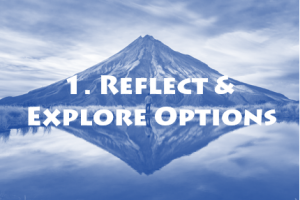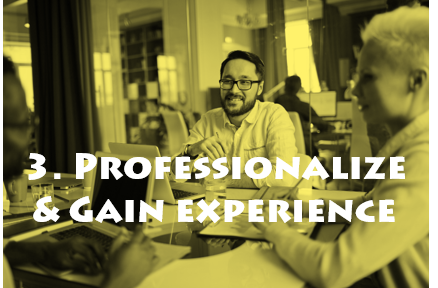Having the skills and confidence to navigate all aspects of your job search successfully is essential for your career development. Career Services is here to support you throughout this process, from helping you present yourself well both on paper and in person to potential employers to equipping you with the knowledge and strategies to help you land your job offer.
Preparing for Postdocs & Faculty Careers
If you’re interested in applying for faculty positions, it’s helpful to start preparing your written application materials a few months before positions are advertised in your discipline(s). Career Services can give you perspectives on how you can tailor your application to specific kinds of institutions and help you prepare to speak about your research and teaching in interviews. Once you are have received a job offer, we are also happy to guide you through negotiations. If you’re seeking postdoc positions, we can also help you in achieving that goal. Make an appointment with a Career Advisor via Handshake at any stage of your application process.
Timeline for Applying
Many colleges and universities begin the search for a tenure-track faculty member almost a full academic year before the anticipated start date of their new hire. Generally, social science disciplines begin posting faculty job positions during the summer a year before, while humanities and STEM fields start posting during the fall. However, institutions will also sometimes post tenure-track job openings outside of these common timelines. It’s a good idea to check with faculty and colleagues in your department(s) to get their insights into when you should start searching for faculty job postings.
Career Services can help you utilize online tools to track openings. If you’re applying for postdocs, visiting assistant professor roles, or other non tenure-track positions, consult with faculty and colleagues in your disciplines(s) to learn about those timelines.
Where to Search for Academic Jobs
Academic job listings are usually listed through disciplinary and professional associations, so be sure to consult those organizations as well as your advisors and colleagues in your department(s) and disciplines. In addition, you can find comprehensive academic job listings on ChronicleVitae, HigherEdJobs, Insider Higher Ed, and Higher Education Recruitment Consortium (HERC). Don’t forget to set job alerts when possible, so that you can be notified of job opportunities that match your preferences and criteria.
Understanding and Tailoring for Different Kinds of Institutions
As you’re applying for academic positions, it’s important to understand what kind of institution you’re applying to so that you can demonstrate to search committees your strong fit not only for the role but also for their institution and community. For each application, try to determine how much the institution values research vs. teaching. Does it prioritize one over the other? Is it a private or public institution? Who are the students that they serve? Do they have graduate students? Speak with a Career Advisor to learn about strategies to research different colleges and universities as you tailor your applications for each one. Find information on creating effective application materials for faculty positions here.
Preparing for Careers Beyond Academia
Whether you’re applying for jobs in industry, non-profits, or government in addition to or instead of academic positions, Career Services can help you navigate the timeline and process of seeking jobs in a diversity of fields. We’re here to help you translate and communicate the skills and experiences you’ve gained in graduate school as you demonstrate your fit for different roles, organizations, and industries. We can guide you through the application, interviewing, and negotiation phases to help you successfully land a job in a career field that interests you. Make an appointment with a Career Advisor via Handshake at any stage of your process.
Timeline for Applying
Unlike academic searches and searches in certain industries like consulting that are cyclical and usually begin a year before a new hire starts, the search process for jobs beyond academia often range from a few to several months as opposed to a full year. This is because when positions open up, it’s often because someone is departing the role, and the employer needs to have someone else in the position as soon as possible to do the job. Sometimes, when a position is newly created or when the employer has leeway to wait for the ideal candidate, the search process can take longer than usual. However, it’s safe to say that if you are looking to apply for jobs beyond academia, it’s often helpful to start actively searching and applying for jobs at least six months in advance of when you’d like to be employed. In the last year before you graduate from Penn, you will be involved in all aspects of your job search, but the stage of actively applying will primarily be in the last six months. If you have flexibility in the timing of completing your degree or program, you may consider applying for roles even earlier to give yourself more time. Although you can’t predict exactly how long your job search will last, you can feel confident in knowing that a common timeline from the moment a job is open to the moment one can begin in that role is often a few months long. If you’re still in the career exploration process and not quite ready to apply for jobs just yet, you can take a look at job ads to start learning about what’s required in roles that you may be interested in.
Where to Search for Jobs
Successful networking can sometimes lead to job opportunities that you find out about through your contacts, but in many cases, you will be actively searching through job and internship listings to find open positions. We encourage you to search for jobs and internships from multiple different sources to ensure that you’ll know about as many opportunities as possible. In addition to using job boards on LinkedIn, Handshake, and websites such as indeed.com, check out our Career Interest Communities to learn more about job and internship listing websites based on your career interests. Don’t forget to set job alerts when possible, so that you can be notified of job opportunities that match your preferences and criteria.
Understanding and Tailoring for Different Roles and Organizations
When you’re applying for jobs outside of academia, it’s important to understand the role and the organization to which you’re applying. Employers are interested in hiring people who would be a strong fit for the job and for their teams, so it’s helpful to do as much research as possible during your application process. In addition to reading the job ad very closely, we recommend that you visit their webpage, Google the organization to read about them in the news, follow them on social media, LinkedIn, Handshake, and most importantly, talk to people in your network who have connections to the organization. If the organization is attending one of Penn’s career fairs, take the opportunity to speak with the recruiter. Ideally, you should conduct informational interviews with people at organizations you’d like to work at, so that you’ll be able to learn more about the organization before you actively apply for positions. Once you have a good idea of what kind of employees that organization is looking for, you’ll be ready to tailor your written application materials to demonstrate why you’d be a strong candidate for the position and the organization. Find information on creating effective application materials for positions in business, industry, non-profits, and government here (resumes/CVs) and here (cover letters).
Action items:
- Make appointments with Career Advisor via Handshake to discuss your job search, review your written job materials, and prepare for interviews and negotiations.
- Search through relevant job ads to see what skills are commonly associated with each role you are interested in.
- Understand all of the terminology and language used in the job descriptions and be able to use them appropriately to describe your experiences.
- Connect the key skills and requirements listed in the job description with similar language used in your application materials to describe your experiences.
- Be prepared to answer the “tell me about yourself” question in a positive way that is relevant to a potential employer.
- Practice commonly asked interview questions by setting up your free Big Interview account.
- Set up a mock interview at Career Services to practice behavioral-based questions.
- Understand what is appropriate to negotiate for in career fields that interest you.
- Know where to find salary information for jobs you are applying to, in order to be prepared to negotiate.
- Practice negotiating and making requests out loud and in a confident, professional tone of voice.
- Be confident in turning down a job if it turns out not to be the best fit for you, and doing so professionally and respectfully.
- Accept a job offer and complete Career Services’ post-graduation career plans survey!









